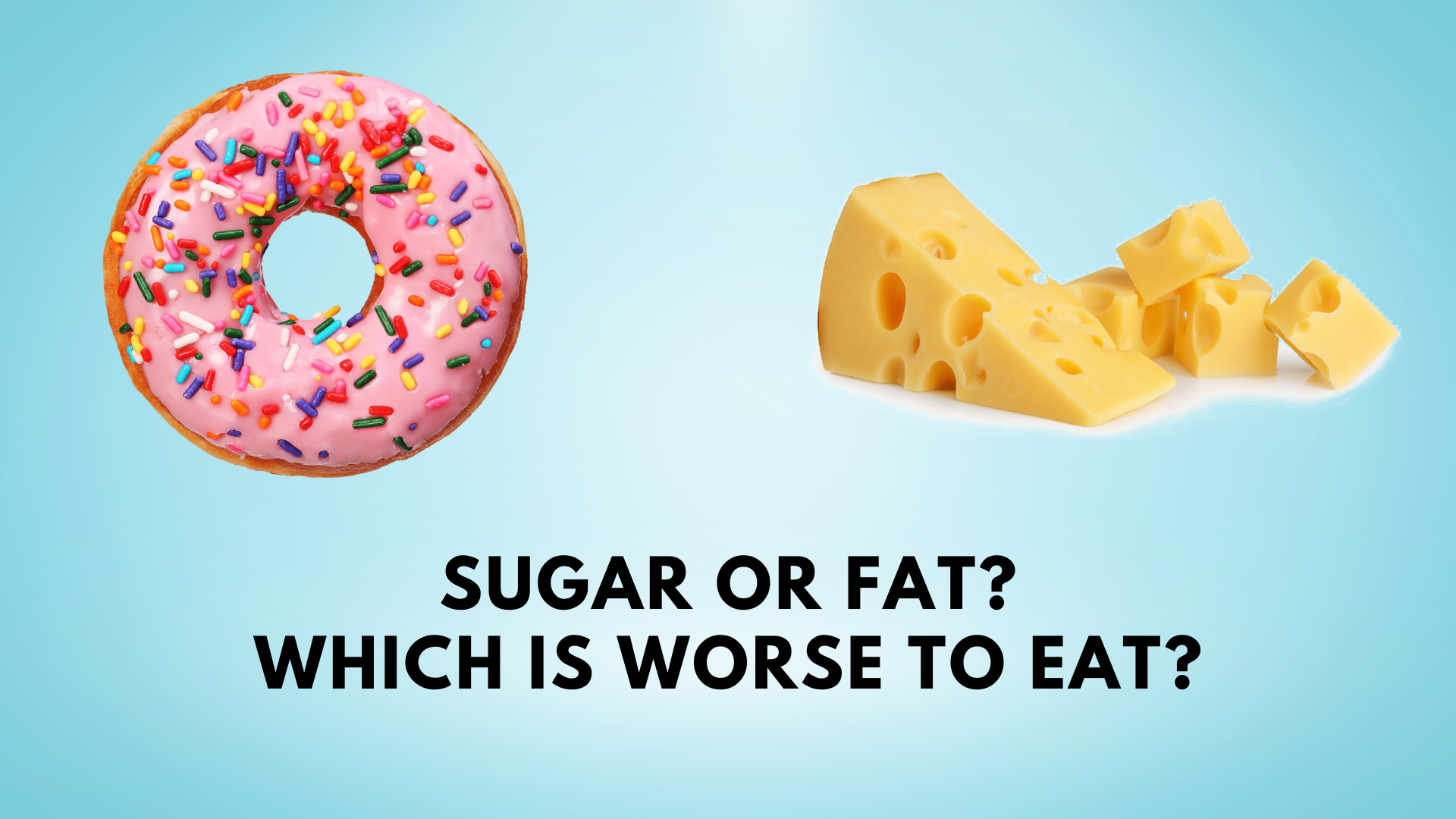For those of you who just want the answer? It’s sugar. Definitely sugar. But read on to learn why.
Understanding the Basics: Sugars vs Fats
Before we delve into the intricate debate of ‘Sugar vs Fat: Which is worse?’, it’s crucial to understand the basics of these two dietary components.
Sugars: Definition and Types
Sugars are simple carbohydrates that provide quick energy. There are two main types: natural and added sugars. Natural sugars are found in fruits (fructose) and milk (lactose). Added sugars include those put in foods during their preparation or processing, like high fructose corn syrup and sucrose.

Fats: Definition and Types
Fats are complex molecules that provide long-term energy. They are classified into four types: saturated, unsaturated, trans, and monounsaturated fats. Each type has a different impact on your health, influencing factors like cholesterol levels and heart disease risk.

Now that we understand the basics, we can delve deeper into which is worse to eat: sugar or fat?
The Role and Importance of Sugar in the Body
Sugar, specifically glucose, is a vital energy source for the body. It fuels your brain, muscles, and other organs, keeping them functioning optimally. When you consume carbohydrates, your body breaks them down into glucose, which is used immediately for energy or stored for later use. The American National Institutes of Health explains in detail about the complex process of sugar metabolism.
The Role and Importance of Fats in the Body
Contrary to popular belief, fats play several crucial roles in the body. They provide a concentrated source of energy, aid in the absorption of fat-soluble vitamins, and serve as building blocks for cell membranes and hormones. Harvard School of Public Health offers more insights into the necessity of fats in our diet.

The Potential Risks of Overindulging in Sugar
Excessive sugar consumption poses numerous health risks, some of which might be more insidious than you’d expect.
1. Impact on Weight and Obesity
Overconsumption of sugars, particularly in the form of sugar-sweetened beverages, has been directly linked to weight gain and obesity. Sugary foods and drinks often contain high amounts of calories but lack nutritional value, leading to increased calorie intake and subsequent weight gain.
2. Effect on Heart Health
Research has shown that high-sugar diets can lead to obesity, inflammation, high triglyceride levels, and diabetes, all of which are risk factors for heart disease.
3. Relation to Diabetes
Consistently high sugar intake can lead to insulin resistance, a key factor in the development of type 2 diabetes. This American Diabetes Association resource provides more information.
4. Influence on Dental Health
Sugar is the primary cause of tooth decay. Bacteria in the mouth feed on sugars, producing acids that erode tooth enamel, leading to cavities. The American Dental Association provides comprehensive information on this issue.

The Risks Associated with Excessive Fat Intake
Heart disease has a proven link to high-fat diets. When we consume more fat than our bodies need, the surplus gets stored as body fat, increasing the risk of heart disease. This can lead to a buildup of cholesterol in your arteries, resulting in clogged arteries and heart attacks.
Furthermore, excessive fat intake is also closely associated with obesity and weight gain. The body stores the excess dietary fat it doesn’t use, leading to weight gain and in turn, obesity.
High fat intake not only leads to weight gain but also increases your cholesterol levels. High cholesterol levels can cause a buildup of plaque in your arteries, increasing your risk of heart disease and stroke.
Last but not least, research suggests that a high-fat diet may be linked to certain types of cancer.
Which is More Addictive? Sugar or Fat?
When it comes to the debate between sugar and fat, recent research sheds light on their distinct impacts on the brain. In an experiment involving chocolate milkshakes with varying fat/sugar ratios, it was observed that while high-fat content activated regions of the brain linked to associative learning, high-sugar shakes stimulated areas associated with reward, motivation, and taste. This suggests that sugar can be particularly addictive, with its effects intensifying with increased consumption. In contrast, the brain’s response to fat remained consistent, regardless of the amount consumed.
Furthermore, our brains are evolutionarily predisposed to seek sugar, making it a primary reward, while fat is more of a texture influenced by early conditioning. This indicates that we might have more control over our fat intake than sugar. Despite the frequent pairing of sugar and fat in many treats, the study found no combined effect on brain activation.
Dr. Travis Stork, cohost of TV’s “The Doctors,” emphasizes that sugar addiction is real and can rewire our brains, likening its effects to those of drugs or alcohol. As we navigate our dietary choices, it’s crucial to be aware of these findings and prioritize reducing sugar intake for better health.
In short? Eating sugar creates hunger. Not just because it lacks bulk or the ability to provide long-lasting energy. it’s downright addictive. A high-sugar diet ensures you will eat more. Now, if the “more” also contains fats… you are in big trouble… but it’s the sugar addiction that is going to be the primary factor in that overeating in the first place. Beware of “lower calorie” options that may contain less fat, and more sugar as the outcome might be not as you’d expect.
Nutritional Value: Comparing Sugars and Fats
When analyzing the caloric content and energy provision of sugars and fats, it’s clear that fats are more calorically dense, providing approximately 9 calories per gram, compared to sugars, which provide around 4 calories per gram. However, this doesn’t necessarily mean fats are worse for your diet. They are essential for numerous bodily functions and can even aid in the absorption of certain nutrients.

In terms of nutrient density and contribution to a balanced diet, both sugars and fats have their roles. Natural sugars, found in fruits and vegetables, contribute essential nutrients and fiber. Fats, particularly unsaturated fats, are vital for brain function and cell growth. However, the key is moderation and balance. Consuming too much of either can lead to health problems such as obesity, heart disease, and diabetes. The USDA’s MyPlate initiative provides a comprehensive guide on how to balance your diet.

When it comes to the question ‘sugar or fat?’, it’s not about choosing one over the other, but rather understanding their nutritional values and incorporating them into your diet in a balanced and healthy way.
The Controversy: Debating Which Is Worse – Sugar or Fat?
The nutrition world is rife with debate on whether sugar or fat is more detrimental to our health. Some health experts argue that sugar, particularly in its refined form, is the major culprit, driving obesity and promoting diseases such as diabetes and heart disease.

Conversely, others in the nutrition field maintain that saturated fats are the real issue, raising cholesterol levels and increasing the risk of heart disease.
Analyzing the Science
An examination of recent scientific research suggests a more nuanced understanding. Studies like the PURE study highlight that both excessive sugar and saturated fat intake can be harmful, but in different ways. While sugar contributes to obesity and metabolic disorders, saturated fats can lead to cardiovascular disease.
Ultimately, a balanced diet, rich in fruits, vegetables, whole grains, and lean proteins, can help mitigate the health risks associated with both sugar and fat. This underscores the importance of viewing nutrition holistically, rather than vilifying single nutrients.

The Importance of Moderation and a Balanced Diet
A well-rounded diet is an essential component of a healthy lifestyle. Sugars and fats, contrary to popular belief, play crucial roles in such a diet.
The Role of Sugars and Fats in a Healthy Diet
Both sugars and fats are essential macronutrients. Sugars are the body’s main source of energy, while fats help absorb vitamins, protect vital organs, and maintain body temperature. However, it’s important to differentiate between healthy and unhealthy fats and added sugars and natural sugars.

The Dangers of Extremes: Overconsumption and Deprivation
While sugars and fats are necessary, overconsumption can lead to health issues like obesity, heart disease, and diabetes. On the other hand, severe deprivation can result in nutrient deficiencies and decreased energy levels. Hence, striking a balance is key. For expert guidelines, consider the Dietary Guidelines for Americans.
Practical Tips for Managing Sugar and Fat Intake
Understanding and managing your sugar and fat intake is crucial for a healthy lifestyle. The American Heart Association recommends that women should consume no more than 6 teaspoons (25 grams) of added sugar and men no more than 9 teaspoons (38 grams) per day. For fats, it’s best to limit saturated fats to less than 6% of total daily calories.
Tips for Cutting Down on Sugars and Fats
- Read food labels carefully to understand the amount of sugar and fat in each serving.
- Opt for unprocessed, whole foods whenever possible.
- Use natural sweeteners like honey or stevia instead of refined sugar.
- Choose lean meats and low-fat dairy products to reduce fat intake.

Suggestions for Healthier Alternatives and Substitutions
Substitutions can make a big difference in your diet. Use avocado as a healthy fat substitute for butter or mayonnaise. Opt for high-fiber fruits like berries or apples instead of sugary snacks. Switching to whole grains can also help control blood sugar levels.
.



